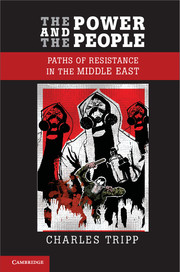Book contents
- Frontmatter
- Contents
- List of Illustrations and Credits
- Acknowledgements
- Glossary
- List of Abbreviations
- Introduction
- 1 State Capture and Violent Resistance
- 2 Contesting Public Space
- 3 Imposition and Resistance in Economic Life
- 4 Body Politics
- 5 History Wars
- 6 Symbolic Forms of Resistance
- Conclusion
- Notes
- Bibliography and Further Reading
- Index
Introduction
Published online by Cambridge University Press: 05 January 2013
- Frontmatter
- Contents
- List of Illustrations and Credits
- Acknowledgements
- Glossary
- List of Abbreviations
- Introduction
- 1 State Capture and Violent Resistance
- 2 Contesting Public Space
- 3 Imposition and Resistance in Economic Life
- 4 Body Politics
- 5 History Wars
- 6 Symbolic Forms of Resistance
- Conclusion
- Notes
- Bibliography and Further Reading
- Index
Summary
In early March 2011, a group of teenagers in the Syrian border town of Dar`a, fired up by the spirit of rebellion that they had seen sweeping across the Arab world, went out one night to paint graffiti on walls in the town. Prominent among the slogans they sprayed was the call that had been reverberating through the Arab world since the uprising in Tunisia in January: ‘al-sha`b yurid isqat al-nizam’ [the people want the downfall of the regime]. If they were hoping that the citizens of Dar`a would wake up the next day to be amazed and secretly gratified by their daring, they were right. But they also discovered the danger of such an act and such words in a country that had been ruled under ‘emergency laws’ for more than forty years. The teenagers were rounded up by the political security police, incarcerated in its grim headquarters and subjected to the beatings and burnings that were part of the routine brutality of the force. When the boys’ relatives came to try to find them, they were treated with contempt by the governor and his security officials who told them to forget about the boys and to go home.
This triggered a series of public protests in the town. The arrests, the rumours of torture and finally the contemptuous attitude of the officials were too much to bear. Joined by hundreds of others, the boys’ relatives marched through Dar`a demonstrating their anger. Chants and slogans were shouted against the regime, posters of the president, Bashar al-Asad, were defaced, a statue of his father, Hafiz al-Asad, the late president, was toppled and destroyed, the ruling Ba`th party headquarters and the court building were torched, as were the offices of Syriatel, the telecoms company owned by Rami Makhlouf, a first cousin of the president. The Syrian security forces responded by firing into the crowds in an effort to drive them from the streets. A number of people were killed and dozens wounded but were denied access to the town’s hospital. Instead, the citizens turned the al-`Umari mosque in the old town into a provisional medical station to treat casualties. This was then raided by the security forces, with further loss of life, including one of the doctors. In all, five people died violently in Dar`a that day.
- Type
- Chapter
- Information
- The Power and the PeoplePaths of Resistance in the Middle East, pp. 1 - 18Publisher: Cambridge University PressPrint publication year: 2013



